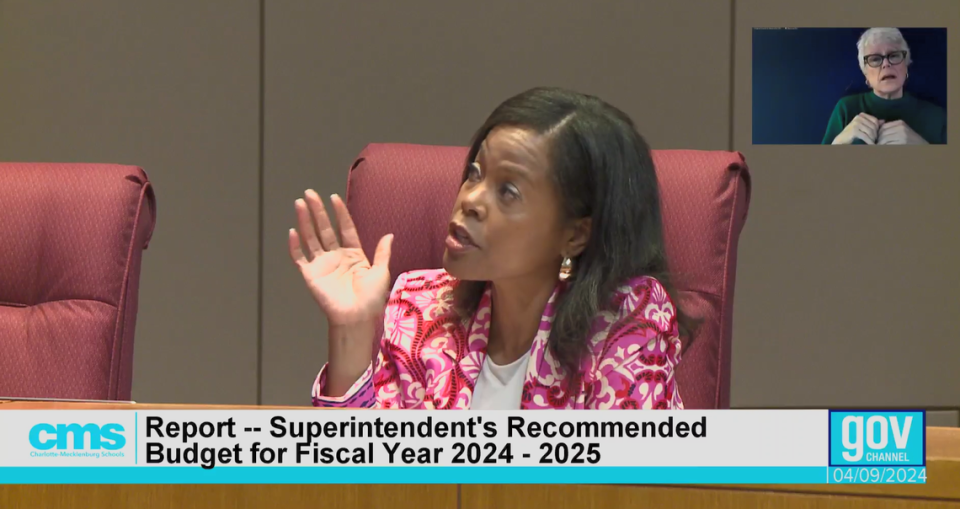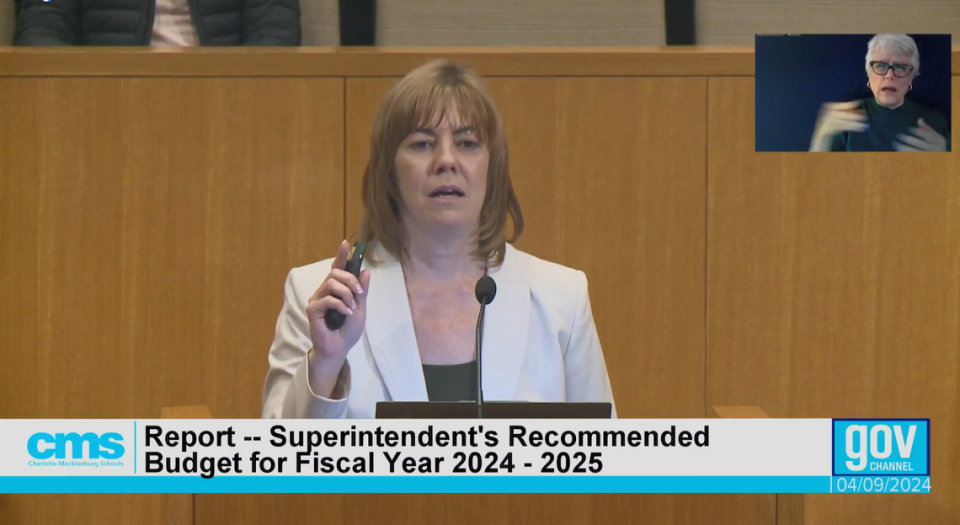CMS superintendent seeks teacher raises in 2024-25 budget proposal. Here’s how much
Teachers and other Charlotte-Mecklenburg Schools employees could receive pay raises under Superintendent Crystal Hill’s 2024-2025 operating budget proposal presented Tuesday.
The $1.9 billion plan includes a $631.9 million request to county government. That’s a 5.86%, or $35 million, increase over the $596.9 million county-funded operating budget this year. Of the additional $35 million in recurring funding the district is seeking from Mecklenburg County, $14.2 million would go toward increasing teacher pay.
“The community has repeatedly reiterated that education is a top priority for Mecklenburg County residents, which must be supported financially,” CMS board chair Stephanie Sneed said Tuesday. “We have an obligation to support our staff as well as our students. We cannot have great student outcomes without it.”
All teachers in North Carolina are paid according to the same salary guidelines set by the state legislature. The current base salary for beginning teachers in the state is $39,000, and it will reach $41,000 by the end of the 2024-25 fiscal year, according to projections presented Tuesday.
Individual districts also can boost teacher pay by offering a supplement.

“Last year, we were really intentional about trying to increase salaries for our new teachers and staff,” Hill said. “This year, you’ll see that we’ve taken feedback from teachers and are trying to be intentional about retaining our most experienced teachers, in year 20-plus in the district.”
Hill’s proposed budget includes an increase to teacher supplements for educators who have been teaching in NC public schools for 25 years or more by 6.2% — from $11,457 to $12,169.
The plan calls for an average teacher supplement of $10,801, a 5% increase over this year. That includes an increase to starting teacher supplements by 4.5% — to a total supplement of $7,636. However, this would still leave starting teacher salaries below a livable wage.
If the budget proposal passes, CMS projects beginning teachers will make a total of $48,636 during the 2024-25 school year. Meanwhile, the cost of living for an individual renting an average one-bedroom apartment in Charlotte sits at around $61,000 per year.

“Right now, our 25-year teachers make a livable wage, but we do have a larger proportion of teachers who are earlier in their career,” said the district’s CFO Kelly Kluttz.
Around 1,400 of the district’s teachers have 25 or more years of experience. Almost 9,500 teachers have less than 25 years of experience.
North Carolina currently ranks 36th in the nation for average teacher salary and 46th for starting teacher salary, landing it last among states in the Southeast, according to the most recent data from the National Education Association.
Other CMS pay increases
CMS also plans to increase starting pay for hourly employees such as janitors, bus drivers and cafeteria workers to $17.25 per hour. In two years, it aims to increase starting wages for these employees to $20 per hour. CMS also wants to create more salary incentives for hourly employees for years spent in state service — either with CMS or another district.
The hourly employee pay raises and incentives would cost around $9.8 million per year for three years.
The beginning hourly rate in CMS is currently $15.60, while the average living wage for one adult in Mecklenburg County is $18.20 per hour. Kluttz told Mecklenburg County commissioners at a meeting Feb. 21 there are 1,466 employees in CMS who currently earn less than $17.25 an hour.
Low wages with little opportunity for raises are causing retention problems for CMS when it comes to hourly employees.
“Our competitors, like surrounding governmental agencies, have starting pay at around $20 per hour,” Hill told community members at a budget workshop at Olympic High School in March.
County commissioners agreed raising starting hourly pay in CMS is a top priority during a meeting earlier in the year.
“I’d like to see us get starting pay to $20 or even $22 in the next couple of years,” Pat Cotham, current Mecklenburg County commissioner, said at the Feb. 21 meeting.
Other expenses
Other items in CMS’ budget proposal, which are not included in the $35 million recurring funding number, include:
$57 million in delayed maintenance costs across 30 facilities. Hill recommended spreading the expenses across three years, with $19.2 million to be put toward the deferred maintenance costs during the 2024-25 fiscal year. This doesn’t include buildings that will be renovated or replaced as part of the $2.5 billion bond referendum passed last year.
$16 million each year for the next four years on technology updates for students. CMS aims for each student to have a personal learning device they can take home next year. While North Carolina requires students to take state assessments on these devices, it does not provide any funding for them.
Employees in certain pay grades making less than $20 per hour next year will receive a one-time bonus to make their total yearly income the equivalent of those making $20 per hour. The following year and moving forward, the minimum wage in CMS will be $20 per hour.
The budget proposal will be studied by school board members, subject to a public hearing on April 23 and a CMS vote on April 30 before heading to the Mecklenburg County Board of Commissioners, which has the final say on funding levels.
The next budget year starts July 1.

